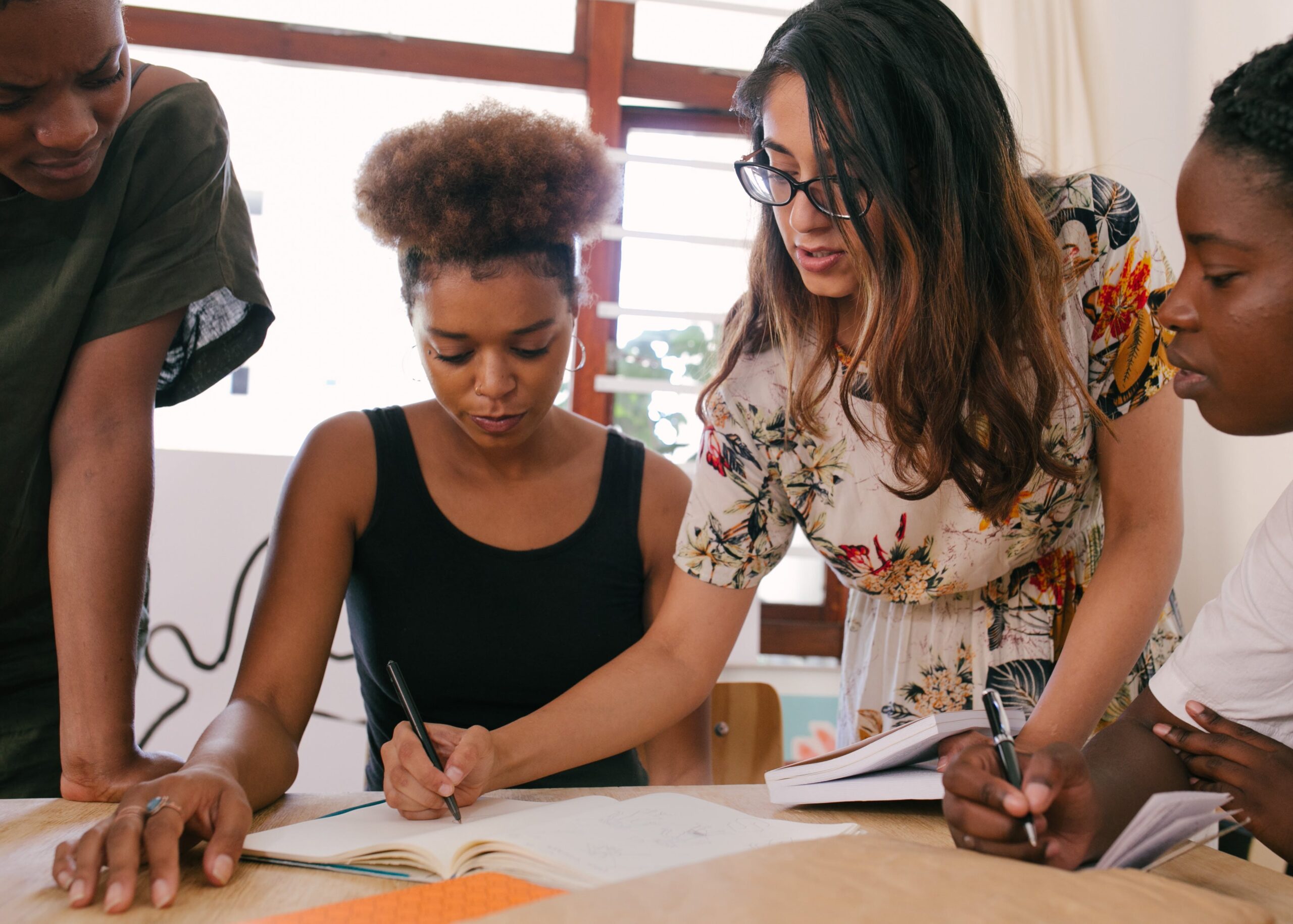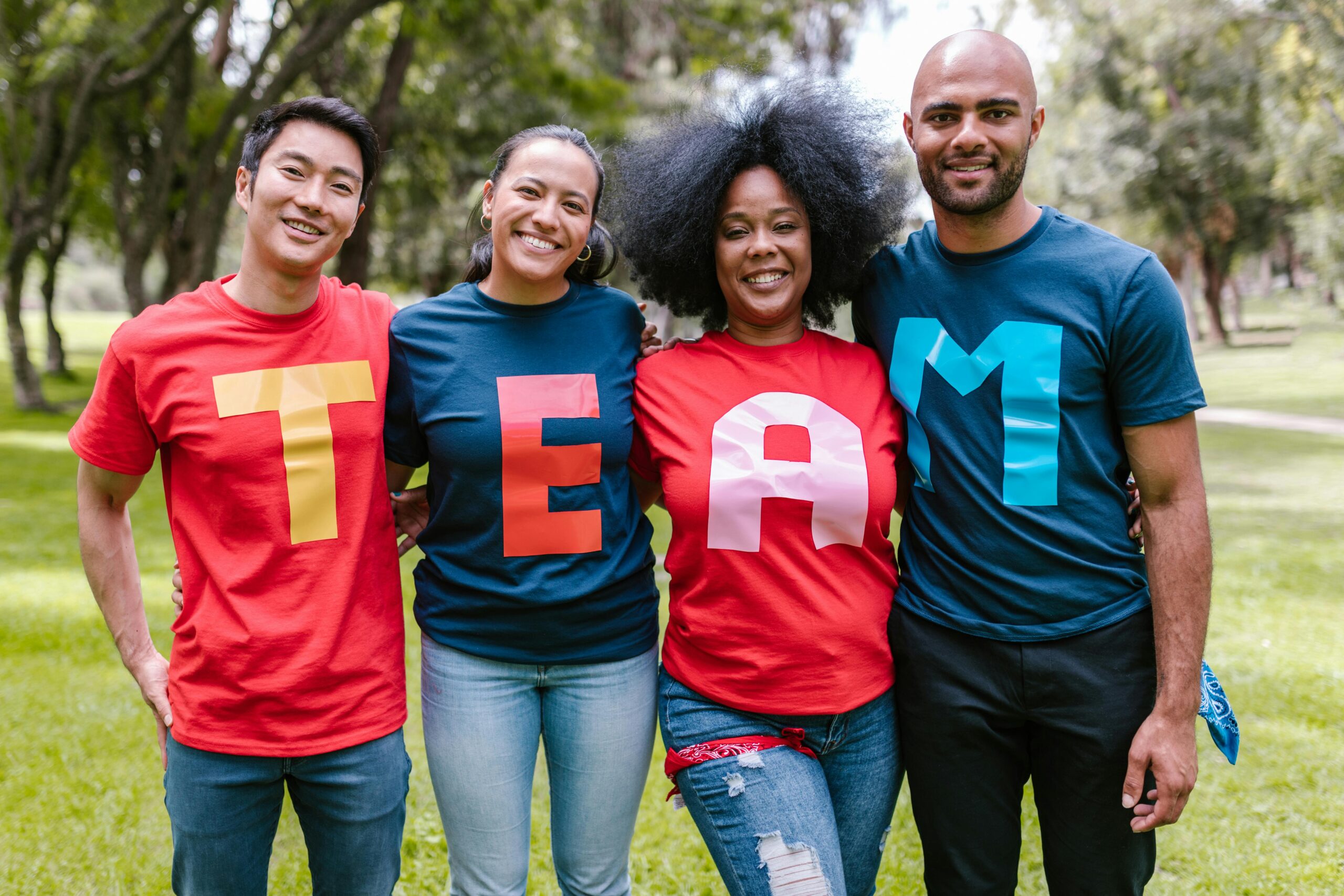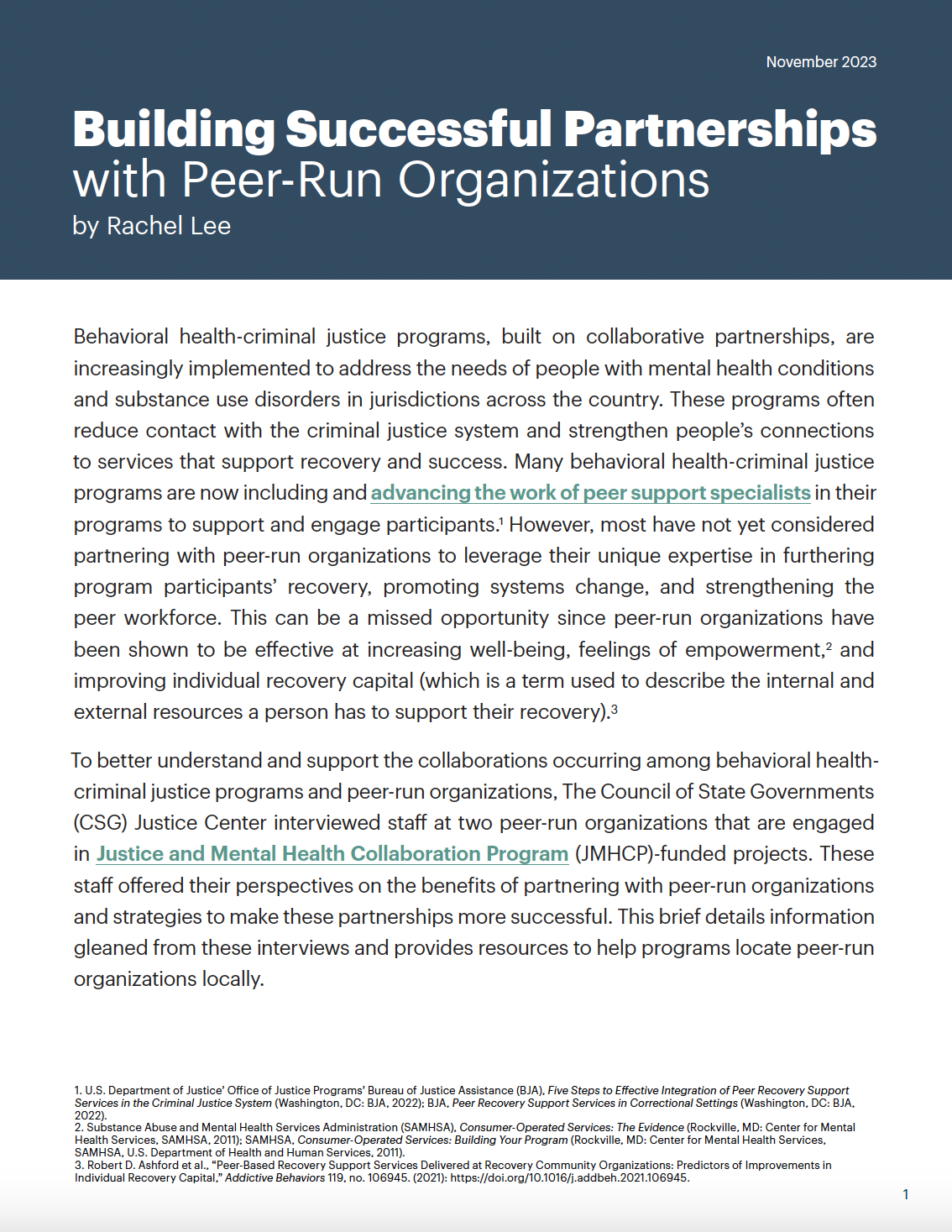Building Successful Partnerships with Peer-Run Organizations
Behavioral health-criminal justice programs that partner with peer-run organizations have been able to leverage their unique expertise in furthering program participants’ recovery, promoting systems change, and strengthening the peer workforce. But often, programs do not know where to start to ensure they are developing a successful partnership. This brief details information gleaned from interviews with two peer-run organizations engaged in Justice and Mental Health Collaboration Program-funded projects and provides resources to help programs locate peer-run organizations locally. Photo credit: RF_studio via Pexels.com
Building Successful Partnerships with Peer-Run Organizations
Behavioral health-criminal justice programs, built on collaborative partnerships, are increasingly implemented to address the needs of people with mental health conditions and substance use disorders in jurisdictions across the country. These programs often reduce contact with the criminal justice system and strengthen people’s connections to services that support recovery and success. Many behavioral health-criminal justice programs are now including and advancing the work of peer support specialists in their programs to support and engage participants.1 However, most have not yet considered partnering with peer-run organizations to leverage their unique expertise in furthering program participants’ recovery, promoting systems change, and strengthening the peer workforce. This can be a missed opportunity since peer-run organizations have been shown to be effective at increasing well-being, feelings of empowerment, 2 and improving individual recovery capital (which is a term used to describe the internal and external resources a person has to support their recovery).3
To better understand and support the collaborations occurring among behavioral health-criminal justice programs and peer-run organizations, The Council of State Governments (CSG) Justice Center interviewed staff at two peer-run organizations that are engaged in Justice and Mental Health Collaboration Program (JMHCP)-funded projects. These staff offered their perspectives on the benefits of partnering with peer-run organizations and strategies to make these partnerships more successful. This brief details information gleaned from these interviews and provides resources to help programs locate peer-run organizations locally.
What are peer-run organizations?
For the purposes of this brief, the term “peer-run organization” refers to any organization that is owned and operated by people who have direct experience with mental health conditions and/or substance use disorders and have sometimes previously been involved in the criminal justice system. These organizations typically operate as independent 501(c)3 nonprofits, although they can exist under the fiscal umbrella of a supportive entity, such as a mental health service provider or local mental health association.4
To qualify as a peer-run organization, at least 51 percent of the nonprofit’s board members must be people with this lived experience.5 There are different types of peer-run organizations, including mental health consumer-run organizations, wherein people who have used mental health services have both decision-making authority and manage day-to-day operations,6 and recovery community organizations that are operated by people in recovery from a substance use disorder.7 While peer-run organizations can have a range of focus areas, they typically center activities and offer programs that promote self-help and recovery. Their work is also often built on three core principles: “a recovery vision, authenticity of voice, and accountability to the recovery community.”8
Benefits of Partnering with Peer-Run Organizations
1. Aids in expanding and strengthening the peer support specialist workforce
Peer support specialists are critical to the success of behavioral health-criminal justice programs because they can draw on their lived experience with behavioral health conditions and criminal justice involvement to directly support participants. However, many programs struggle to hire and retain these employees. Often, these challenges are due to the difficult nature of the work, low pay, insufficient training, stigma,9 and more recently, peoples’ increased desire to work remotely after doing so during the COVID-19 pandemic. Programs that have partnered with a peer-run organization, however, have been able to offset some of these challenges.
Peer-run organizations, which typically employ peer support specialists, are often able to help expand the peer support specialist workforce by directly providing staff for a behavioral health-criminal justice program. For example, the Substance Abuse and Addiction Recovery Alliance (SAARA) in Virginia employs two peer recovery specialists who support participants in the Circuit Court Behavioral Health Docket. Peer-run organizations have also helped systemically expand the number of peer support specialists available for hire in a given region by offering the trainings necessary for people to get certified by the state and even financial assistance to take the peer certification training. The Mental Health & Addiction Association of Oregon’s (MHAAO) Project PEER, for example, aims to make peer support more accessible in historically underserved communities by providing tuition coverage for peer certification training, a laptop, and a living expense stipend for approved participants. Other peer-run organizations, such as SAARA, have advocated at state and federal levels to reduce barriers for people to become peers. SAARA is now working to change some of the laws excluding people with particular convictions from being able to become peer support specialists and working to increase the Medicaid reimbursement rate so that peer support specialists can earn a living wage.
Partnering with peer-run organizations can also help behavioral health-criminal justice programs better provide their peer support specialists with workforce support that is unique to their needs. Specifically, peer-run organizations can help the peers they employ that are working in behavioral health-criminal justice programs circumvent “peer support drift”—which can occur when their work deviates from the practices that distinguish them from clinical providers or other recovery supports.10 This is because the peers receive supervision, mainly from people with similar lived experience, and because they are part of an organization that embodies the values of peer support.11 Some peer-run organizations, such as MHAAO, also work with peer support specialists to help them avoid compassion fatigue, vicarious trauma, and burnout by holding support groups.12
JMHCP Peer-Run Organizations
The Mental Health & Addiction Association of Oregon (MHAAO) is “an inclusive peer-run organization dedicated to self-direction honoring the voice of lived experience.”13 Prior to receiving an FY2021 JMHCP award to develop a Behavioral Health Connections program, the Multnomah County Sheriff’s Office (MCSO) had already made it a priority to include peer services for adults in custody by partnering with MHAAO for an in-jail navigator program that included a peer to support reentry and compliance with court appearances and conditions. The success of this collaboration is what helped bring together the formal partnership between MHAAO and MCSO.
_______________________________________________________
The Substance Abuse & Addiction Recovery Alliance of Virginia (SAARA) is a recovery community organization in Virginia that aims to, “transform Virginia communities through hope, education, and advocacy for addiction prevention, treatment, and recovery.”14 SAARA employs two peer recovery specialists who support participants in the Circuit Court Behavioral Health Docket by helping them stay engaged in their recovery process, linking them to various resources, meeting one-on-one, and facilitating weekly Peer Recovery Groups to provide support and guidance through every phase of the participants’ recovery journey. SAARA’s partnership with the Richmond Behavioral Health Authority (RBHA), the behavioral health partner on an FY2019 JMHCP-funded project, has been in place for over a decade and is strengthened because a member of the behavioral health agency’s leadership is on the board of SAARA. RBHA has facilitated numerous connections between SAARA and various system stakeholders.
2. Reduces stigmas and helps to dispel myths among both organizations and the broader public
Unfortunately, both behavioral health-criminal justice programs and peer-run organizations are often challenged by stigmas that result in misunderstanding about their purpose and benefits. Some common stigmas about behavioral health-criminal justice programs are that people use them to lessen their time in custody and that people with behavioral health needs cannot recover from these conditions. Even among partners, there can be myths about working with people who have experience in the criminal justice and/or behavioral health system that they aren’t as knowledgeable or reliable as licensed professionals. There can additionally be myths that people who work in behavioral health-criminal justice programs focus on punishment and consequences as opposed to recovery.
One way that partnering with peer-run organizations can help programs reduce stigma and dispel myths is by increasing the interactions with program staff and the people who have firsthand experience within the justice and health systems. These interactions can then be leveraged to address community concerns and needs together. For example, in Multnomah County, Oregon, the sheriff’s office and peers from MHAAO often accompany each other and co-present at townhalls and community meetings. At these meetings, they talk to community members and try to dispel the myth that people with behavioral health needs or people who are unhoused are choosing to not get better and can show firsthand that recovery is possible. This partnership has also helped to enhance law enforcement engagement in the community as people learn more about the important role officers can play in helping people access necessary treatment and support services.
3. Facilitates the development of trusting partnerships with other community, treatment, and support services
Despite the best of intentions, behavioral health-criminal justice programs may not always have the trust of the community in which they work. For example, some law enforcement agencies have experienced difficulties implementing police-mental health collaborations—partnerships between law enforcement agencies and mental health providers to respond appropriately and safely to people with mental health and other needs—in neighborhoods where there is historic and ongoing distrust of officers. Peer-run organizations, however, have often already established trust among community members and other providers by the time they partner with a behavioral health-criminal justice program. This trust allows peer-run organizations to serve as a bridge to the community to help add credibility to these initiatives and repair relationships with community members so that the programs can start building effective relationships.
4. Helps people envision different employment opportunities for people with behavioral health needs and previous involvement in the criminal justice
An important aspect of recovery for many people is obtaining meaningful employment. While some people in recovery may want to work directly with participants of behavioral health-criminal justice programs as a peer support specialist, there are many people in recovery for whom that job will not be a good fit. Peer- run organizations, which are staffed by peers at all levels and roles within the organization, can demonstrate to people in recovery the variety of opportunities available to them.
Programs that partner with peer-run organizations are uniquely positioned to introduce their participants to organizations that employ staff with experience in the behavioral health and criminal justice systems at all levels. This kind of meaningful interaction can encourage participants to consider employment opportunities that are varied and attainable.

Photo by RF._.studio via Pexels.com
Strategies for Ensuring a Successful Partnership
Just as any other partnership, there are certain strategies that can help ensure a more successful endeavor among behavioral health-criminal justice programs and peer-run organizations. The strategies below were gleaned from interviewed staff at peer-run organizations and the experience of CSG Justice Center staff working closely with behavioral health-criminal justice programs.
- Demonstrate an openness to partner with one another, ideally beginning at the planning process of the program. Having peer-run organizations involved as meaningful stakeholders at the outset can help to shape the ways that participants are engaged, how data are collected, and ways in which the program can regularly improve its progress. For example, the Multnomah County Sheriff’s Office included MHAAO in their JMHCP grant application and made sure staff from the peer-run organization were present at planning meetings before the program was in operation so that they could provide input on planning topics ranging from data collection to participant engagement.
- Develop policies and protocols to enable frequent communication within the partnership to ensure that both partners share the same end goal, are working collaboratively, and understand one another’s specific. A helpful resource for increasing behavioral health and criminal justice organizational preparedness for a successful partnership is the Preparing Organizational Culture section (pages 17-45) within the City of Philadelphia Department of Behavioral Health and Intellectual Disability Services’ Peer Support Toolkit.
- Be creative when strategizing ways that the partnership can be mutually useful. For example, it may be helpful to include peer-run organization staff in the law enforcement recruitment and hiring process since staff at the peer-run organization can provide an important perspective on whether the applicant would be a good fit to work with people experiencing a behavioral health crisis and to work alongside peer support specialists. It may also be helpful to include a visit to a peer-run organization as part of Crisis-Intervention Training, particularly if the organization has a recovery center or clubhouse. In-person visits can help law enforcement and other criminal justice stakeholders better understand how the recovery center works and allow them to meet people in recovery to help reduce any stigmas they may hold.
- Develop data-sharing protocols to ensure that participant data is kept confidential and any sharing of data between the partners adheres to federal and state privacy restrictions. These protocols should be jointly agreed upon, documented in a data-sharing agreement, and followed by all They should also define expectations related to the sharing of participants’ health information between partners, both in terms of what content is shared and under which circumstances. Additionally, the protocols should establish structure around communication practices, including regularly scheduled case conferences or other meetings to discuss individual participant’s progress and to address challenges faced by both peer-run organizations, criminal justice entities, or behavioral health providers within their collaborative relationship.15
Resources to Find Local Peer-run Organizations
The following resources can help programs locate peer-run organizations in their community to potentially partner with:
✔ Consumer-Run Statewide Organizations, which provides a directory of consumer-run organizations by state.
✔ Faces and Voices ARCO Members Interactive Map, which identifies local, regional, and statewide Recovery Community Organizations that are part of the Association of Recovery Community Organizations.
✔ The Center for Justice and Mental Health Partnerships is a free training and support center administered by the CSG Justice Center with support from BJA; it offers training, resources, and support to communities wanting to improve outcomes or enhance current responses for people in their criminal justice systems who have a mental illness or co-occurring substance use disorder. This can include making direct connections to communities already successfully implementing initiatives.

Photo by RDNE Stock project via Pexels.com

This project was supported by Grant No.2019-MO-BX-K001 awarded by the U.S. Department of Justice’s Office of Justice Programs’ Bureau of Justice Assistance (BJA). BJA is a component of the Department of Justice’s Office of Justice Programs, which also includes the Bureau of Justice Statistics, the National Institute of Justice, the Office of Juvenile Justice and Delinquency Prevention, the Office for Victims of Crime, and the SMART Office. Points of view or opinions in this document are those of the author and do not necessarily represent the official position or policies of the U.S. Department of Justice.
Footnotes
- U.S. Department of Justice’ Office of Justice Programs’ Bureau of Justice Assistance (BJA), Five Steps to Effective Integration of Peer Recovery Support Services in the Criminal Justice System (Washington, DC: BJA, 2022); BJA, Peer Recovery Support Services in Correctional Settings (Washington, DC: BJA, 2022).
- Substance Abuse and Mental Health Services Administration (SAMHSA), Consumer-Operated Services: The Evidence (Rockville, MD: Center for Mental Health Services, SAMHSA, 2011); SAMHSA, Consumer-Operated Services: Building Your Program (Rockville, MD: Center for Mental Health Services, SAMHSA, S. Department of Health and Human Services, 2011).
- Robert Ashford et al., “Peer-Based Recovery Support Services Delivered at Recovery Community Organizations: Predictors of Improvements in Individual Recovery Capital,” Addictive Behaviors 119, no. 106945. (2021): https://doi.org/10.1016/j.addbeh.2021.106945.
- SAMHSA, Consumer-Operated Services: The Evidence; National Mental Health Consumers’ Self-Help Clearinghouse, Consumer–run Businesses and Services (Philadelphia, PA: National Mental Health Consumers’ Self-Help Clearinghouse).
- This can include people with a serious mental illness and people who have received services from the public mental health systems as a result of a mental illness See SAMHSA, Statewide Consumer Network Program: Notice of Funding Opportunity No. SM-22-009 (Rockville, MD: SAMHSA, 2022), https://www.samhsa.gov/sites/default/files/grants/pdf/fy-22-scn-nofo.pdf.
- This can include people with a serious mental illness and people who have received services from the public mental health systems as a result of a mental illness See SAMHSA, Statewide Consumer Network Program: Notice of Funding Opportunity No. SM-22-009 (Rockville, MD: SAMHSA, 2022), https://www.samhsa.gov/sites/default/files/grants/pdf/fy-22-scn-nofo.pdf.
- “National Standards for Recovery Community Organizations (RCOs),” Faces & Voices of Recovery, accessed September 13, 2023, https://facesandvoicesofrecovery.org/resource/national-standards-for-recovery-community-organizations/.
- “Peer-Run Organizations,” Mental Health & Addiction Services Ohio, accessed October 21, 2022, https://mha.ohio.gov/community-partners/peer- supporters/peer-run-organizations.
- Margaret Almeida, et “Actionable Items to Address Challenges Incorporating Peer Support Specialists Within an Integrated Mental Health and Substance Use Disorder System: Co-Designed Qualitative Study,” Journal of Participatory Medicine no. 12. (2020):doi:10.2196/17053.
- SAMHSA, Peer Support Services in Crisis Care (Rockville, MD: SAMHSA Advisory, 2022).
- Matthew Chinman, Kevin Henze, and Patricia Sweeney, Peer Specialist Toolkit: Implementing Peer Support Services in VHA. (Pittsburgh, PA: United States Department of Veterans Affairs, 2013); Patrick Hendry, Tom Hill, and Harvey Rosenthal, Peer Services Toolkit: A Guide to Advancing and Implementing Peer- run Behavioral Health Services (Arizona: ACMHA: The College for Behavioral Health Leadership, 2014).
- MHAAO has virtual groups such as “Peer Support for Peer Support Specialists” that are open to any peer support specialists in the field.
- “Vision and Mission,” Substance Abuse & Addiction Recovery Alliance of Virginia, accessed November 1, 2022, https://www.saara.org/vision-mission.
- “About MHAAO,” Mental Health & Addiction Association of Oregon, accessed November 1, 2022, https://mhaoforegon.org/about-us.
- Allison Upton et al, Practical Considerations Related to Release and Sentencing for Defendants Who Have Behavioral Health Needs: A Judicial Guide (New York: CSG Justice Center, 2017).
Project Credits
Writing: Rachel Lee, CSG Justice Center
Research: Rachel Lee, CSG Justice Center
Advising: Dr. Allison Upton, CSG Justice Center
Editing: Darby Baham, CSG Justice Center
Public Affairs: Aisha Jamil, CSG Justice Center
Web Development: Yewande Ojo, CSG Justice Center
Interviewees:
Doug Asboe, Multnomah County Sheriff’s Office, Patrol Operations Captain and City of Troutdale, Oregon Chief of Police
Casey Culley, Peer Support Specialist/Program Manager, Mental Health & Addictions Association of Oregon
Anika Richburg, Deputy Director, Substance Abuse & Addiction Recovery Alliance of Virginia (SAARA)












